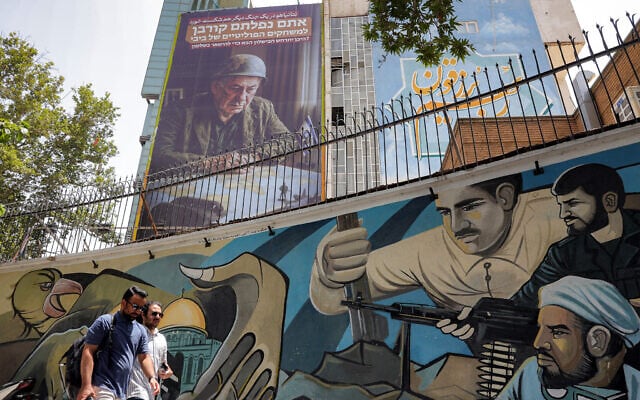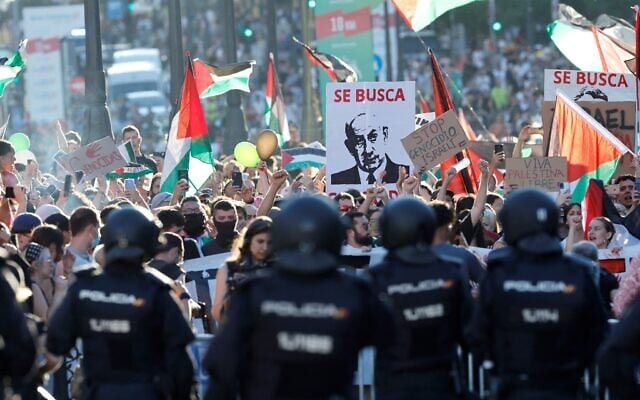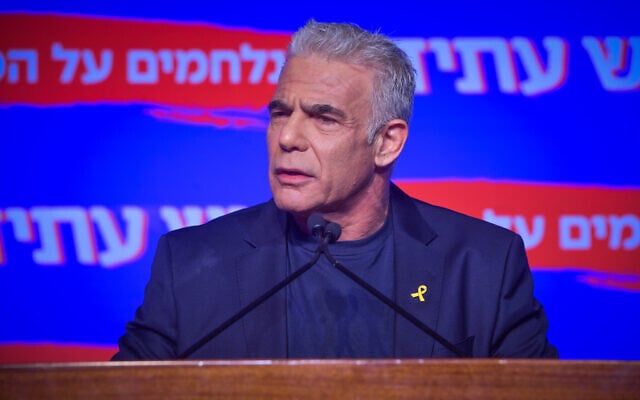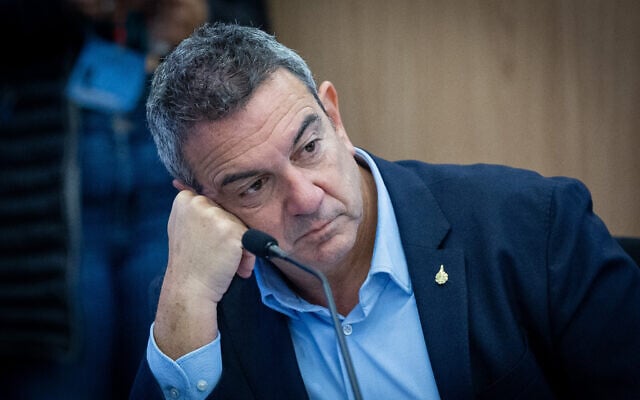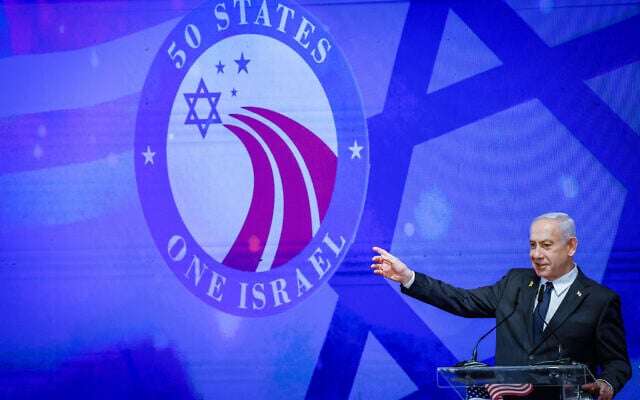

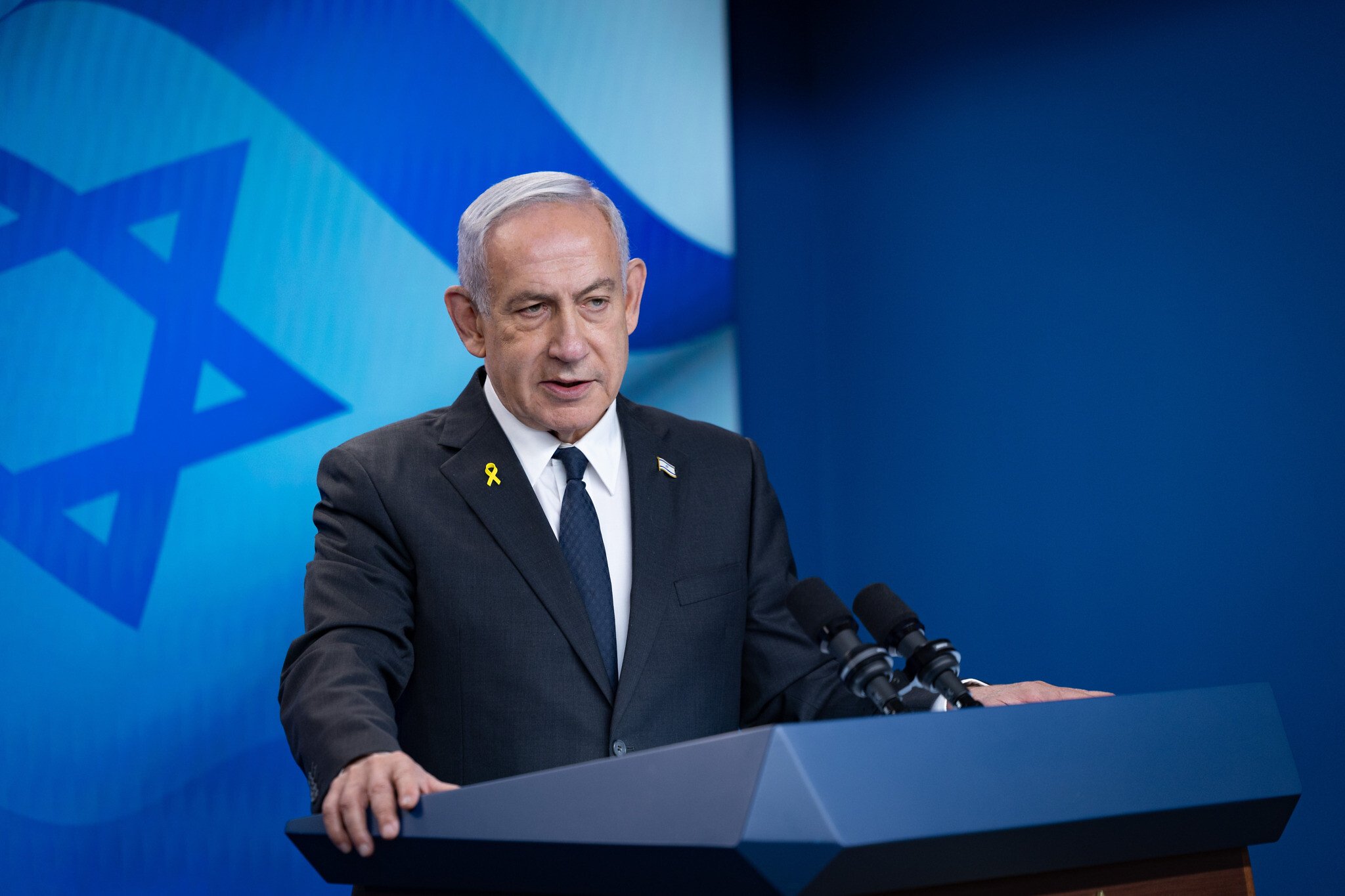
Prime Minister Benjamin Netanyahu admitted on Monday that Israel is facing increasing isolation on the world stage, and will have to become more self-reliant in the years to come.
His comments, delivered as European countries have called for arms embargoes and sanctions against Israel during the ongoing war in Gaza, were seized on by political opponents and high-tech industry groups who blamed the premier for Israel’s troubled status on the world stage.
“Israel is in a sort of isolation,” Netanyahu acknowledged, at a conference of the Finance Ministry’s accountant general in Jerusalem.
“We will increasingly need to adapt to an economy with autarkic characteristics,” he continued, calling the term for economic self-sufficiency, closed off from global trade, “the word I most hate.”
“I am a believer in the free market, but we may find ourselves in a situation where our arms industries are blocked. We will need to develop arms industries here — not only research and development, but also the ability to produce what we need,” he said.
Netanyahu said Israel is facing two new threats since the start of the war: demographic changes in Europe as a result of immigration from Muslim-majority countries and the influence of anti-Israel actors on digital platforms, aided by new technologies.
The premier said these challenges had long been in the works, but came to the fore during the ongoing war sparked by the Hamas terror group’s October 7, 2023, attack in southern Israel.
The prime minister began his speech by praising Jerusalem’s success in its military campaigns against Iran and its terror proxies throughout the region.
According to Netanyahu, these campaigns “eliminated an existential threat that was hanging over our heads, and all of the [other] problems — economic, social, internal — would be irrelevant if we were destroyed.”
He stressed, in particular, the damage done to Iran’s nuclear and ballistic missile programs, asserting that Tehran would have built a nuclear bomb or two, as well as the equivalent destructive power in ballistic missiles, within a year, had Israel not intervened.
However, he said, Israel’s longstanding security challenges have been replaced by new diplomatic issues, which, he said, were long-maturing, but have come to the surface since the war’s start.
Netanyahu first addressed demographic changes in Europe, where “limitless migration” has resulted in Muslims becoming a “significant minority — very vocal, very, very belligerent.” These countries’ Muslim citizens are pressuring European governments to adopt anti-Israel policies, he claimed.
“Their focus isn’t Gaza, it’s opposing Zionism in general, and sometimes an Islamist agenda that challenges those states,” the premier added.
“This is creating limitations, and all sorts of sanctions, on Israel — it’s happening. It’s a process that’s been at work for the last 30 years, and especially in the last decade, and that changes Israel’s international situation. Clear as day,” he said.
The situation could bring arms embargoes and — though these are only threats for now — “the beginnings of economic sanctions,” the prime minister warned.
The second challenge, according to Netanyahu, is the investment of Israel’s “rivals — both NGOs and states, like Qatar and China” — to “influence Western media with an anti-Israel agenda, using bots, artificial intelligence, and advertisements.” He cited TikTok as an immediate example.
“This puts us in a sort of isolation,” he said, adding that Israel can fight demonization and incitement if it invests “very large sums” into efforts to counter those narratives.
But for now, he said, Israel must quickly establish the capacity to produce everything it needs militarily without depending on foreign trade.
“We are Athens and Sparta. But we’re going to be Athens and super-Sparta,” he said. “There’s no choice; in the coming years, at least, we will have to deal with these attempts to isolate us.”
Netanyahu’s comments drew immediate backlash from his domestic political opposition and from industry groups, as the Tel Aviv stock exchange dipped following the premier’s speech.
Opposition Leader Yair Lapid said in a statement: “Isolation is not fate. It’s a product of a wrongheaded and failed policy by Netanyahu and his government, who have turned Israel into a third-world country, and aren’t even trying to change the situation.”
The Democrats chair Yair Golan fumed that, “Netanyahu ‘blesses’ the citizens of Israel for the Rosh Hashanah holiday: To protect my seat, I need a forever war and isolation. And you all will sacrifice the state, the economy, and your children’s future, and their connection to the world. Our answer to this vile man: This year, we will replace you and save Israel.”
Gadi Eisenkot, the former member of Netanyahu’s war government who recently left the National Unity party, blasted “the paralysis that has gripped Netanyahu and the ‘October 7 Cabinet’ in its management of the war in Gaza for more than a year,” adding: “If the prime minister doesn’t know how to fix the situation, then he should turn over the keys and return his mandate to the people, immediately.”
Manufacturers’ Association of Israel President Ron Tomer said that Netanyahu “said publicly what we’ve been feeling and warning against: The Israeli brand, of creativity, demand, and success, has been seriously harmed in the world.”
“Israeli industry will ensure that we are never lacking — not in security, not in food, and not in anything vital to the Israeli economy. That being said, an autarkic market will be a disaster for Israel’s economy and will influence every citizen’s quality of life,” he said.
The High-Tech for Israel Forum said in a statement: “Is this the prime minister’s vision — that we go back to being an orange seller?”
And just minutes after the prime minister’s speech, leading indexes on the Tel Aviv stock exchange went down by as much as two percent, though it recovered by about half, later in the day.
Later on Monday, Netanyahu returned to the same themes, speaking to a delegation of 250 US state legislators at the Foreign Ministry in Jerusalem.
“We value and cherish your support,” the premier told the delegation — the largest group of legislators from a single country ever to visit Israel — adding that “there is an effort to erode [that support].”
“An effort to besiege — not isolate as much as besiege Israel — that is orchestrated by the same forces that supported Iran,” he continued.
While Iran attempted “a military siege” on Israel through its network of terror proxies, and Israel was “able to break loose from that siege,” the premier said, “we will have to do several things to break loose from this siege that is organized by a few states.”
He named those states: “One is China. And the other is Qatar. They are organizing an attack on Israel… [through] the social media of the Western world and the United States. We will have to counter it, and we will counter it with our own methods,” he said.
Later, speaking to i24 News, Netanyahu said: “Have [China and Qatar] achieved global isolation [of Israel]? No. The US is with us, as are many other countries. But we do currently have a problem centered in Western Europe, and we are working and will continue to work to remove this blockade.”
In a second stab at damage control following the stock market dip, the prime minister said in a statement Monday evening: “To all the doom-and-gloom forecasters in economics, in the end the Israeli stock market is the strongest in the world.”
“The shekel has strengthened, the deficit has shrunk despite the war, and foreign investment in R&D is the highest in the world after the United States. Investing in Israel is the smart thing to do,” he said.
Netanyahu added that his government will continue to “increase investments in weapons production so as not to be dependent on weak Western European leaders who give in to the extreme Muslim minorities in their countries — and that is exactly what we are doing.”
His office also shared a graph showing that Israel ranks second in the world in R&D investment.


